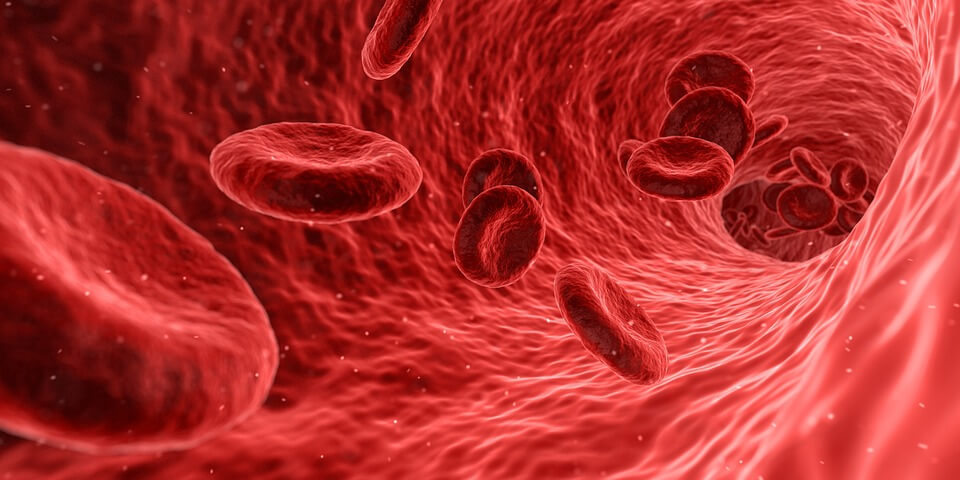Hughes Syndrome and Spontaneous Abortions

In this article we’ll share with you all you need to know about Hughes syndrome and spontaneous abortions.
Are you trying to get pregnant and wish to achieve a successful delivery? If you’ve suffered from the loss of one or several fetuses due to spontaneous abortions, you may be suffering from Hughes syndrome.
This pathology has been the subject of multiple studies and now treatment is being developed that allows patients to enjoy better quality of life.
What is Hughes syndrome?
Hughes syndrome is a rare condition in which the blood presents a viscous and sticky texture.
This characteristic of the blood causes a tendency to form clots in the blood vessels of whoever is suffering from it. These blood clots in blood vessels are also known as thrombosis.
It can occur in any vein of the circulatory system and it can even occur in arteries. The latter increases the risk of suffering from strokes.
When it comes to pregnant women, Hughes syndrome can cause spontaneous abortions during the second trimester since the placenta is not resistant to its effects.

Causes of Hughes syndrome
This disease is also known as antiphospholipid antibody syndrome or SAF.
The cause of this disease is the production of abnormal proteins which are designated as antiphospholipid autoantibodies in the blood.
These antibodies stimulate the immune system which in turn favors the coagulation of blood.
Types of Hughes syndrome
- Primary. The disease is considered to be primary when it isn’t associated with other diseases such as lupus.
- Secondary. Secondary Hughes syndrome is due to an autoimmune disease where damage is exerted on several systems in the body including the vascular system.
Symptoms of the Hughes syndrome
This disease doesn’t usually have symptoms that warn about its presence.
However, it can have certain signs that can be confused with other diseases. The most frequent symptoms are:
- Intense headaches or migraines.
- Joint pain.
- Circulatory disorders.
- Cold skin.
- In acute cases, epilepsy and blue-purple skin coloration can appear around the knees and elbows.
Women who suffer from this disease may have a spontaneous abortion in the first 10 weeks of pregnancy. In some cases, they may reach the 34th week of pregnancy before having a premature delivery.
How is Hughes syndrome diagnosed?
The diagnosis of this disease can only be done by a doctor. The doctor will evaluate the woman’s personal history, family history, perform a physical examination and request certain laboratory tests to rule out or confirm the presence of the disease.
Doctors use specialized blood tests to detect the presence of antiphospholipid antibodies.
It is also important to share with the doctor information about the appearance of blood clots and other symptoms you may be feeling.
Keep in mind that Hughes syndrome can affect people of all ages. However, good medical treatment can significantly improve the patient’s quality of life.
Common complications of Hughes syndrome
This condition can be treated with aspirin, heparin or warfarin. All of these anticoagulants can help prevent the formation of blood clots when administered in specific doses.
If the disease isn’t diagnosed early, Hughes syndrome can bring along other complications such as strokes, blindness and heart attacks.
In addition, the creation of blood clots can also prevent constant blood flow throughout the body.
Another complication that is related to this disease is the formation of blood clots in the lungs. This can cause shortness of breath, chest pain and cough.

Hughes syndrome and pregnancy
Despite all of the complications that Hughes syndrome can cause, it is still possible to have a successful pregnancy. In the case of planned pregnancies, previous treatment to dilute the blood before conception is recommended.
Without adequate treatment the woman may suffer from clots in the placenta which impede the supply of nutrients to the fetus. This can lead to miscarriages and preeclampsia.
In the case of women who are already pregnant, most doctors prescribe aspirin. Treatment helps reduce the blood’s viscosity and can guarantee successful pregnancies in up to 80% of patients.
In conclusion, timely treatment of Hughes syndrome can lead to a successful pregnancy and the prevention of spontaneous abortions.
In this article we’ll share with you all you need to know about Hughes syndrome and spontaneous abortions.
Are you trying to get pregnant and wish to achieve a successful delivery? If you’ve suffered from the loss of one or several fetuses due to spontaneous abortions, you may be suffering from Hughes syndrome.
This pathology has been the subject of multiple studies and now treatment is being developed that allows patients to enjoy better quality of life.
What is Hughes syndrome?
Hughes syndrome is a rare condition in which the blood presents a viscous and sticky texture.
This characteristic of the blood causes a tendency to form clots in the blood vessels of whoever is suffering from it. These blood clots in blood vessels are also known as thrombosis.
It can occur in any vein of the circulatory system and it can even occur in arteries. The latter increases the risk of suffering from strokes.
When it comes to pregnant women, Hughes syndrome can cause spontaneous abortions during the second trimester since the placenta is not resistant to its effects.

Causes of Hughes syndrome
This disease is also known as antiphospholipid antibody syndrome or SAF.
The cause of this disease is the production of abnormal proteins which are designated as antiphospholipid autoantibodies in the blood.
These antibodies stimulate the immune system which in turn favors the coagulation of blood.
Types of Hughes syndrome
- Primary. The disease is considered to be primary when it isn’t associated with other diseases such as lupus.
- Secondary. Secondary Hughes syndrome is due to an autoimmune disease where damage is exerted on several systems in the body including the vascular system.
Symptoms of the Hughes syndrome
This disease doesn’t usually have symptoms that warn about its presence.
However, it can have certain signs that can be confused with other diseases. The most frequent symptoms are:
- Intense headaches or migraines.
- Joint pain.
- Circulatory disorders.
- Cold skin.
- In acute cases, epilepsy and blue-purple skin coloration can appear around the knees and elbows.
Women who suffer from this disease may have a spontaneous abortion in the first 10 weeks of pregnancy. In some cases, they may reach the 34th week of pregnancy before having a premature delivery.
How is Hughes syndrome diagnosed?
The diagnosis of this disease can only be done by a doctor. The doctor will evaluate the woman’s personal history, family history, perform a physical examination and request certain laboratory tests to rule out or confirm the presence of the disease.
Doctors use specialized blood tests to detect the presence of antiphospholipid antibodies.
It is also important to share with the doctor information about the appearance of blood clots and other symptoms you may be feeling.
Keep in mind that Hughes syndrome can affect people of all ages. However, good medical treatment can significantly improve the patient’s quality of life.
Common complications of Hughes syndrome
This condition can be treated with aspirin, heparin or warfarin. All of these anticoagulants can help prevent the formation of blood clots when administered in specific doses.
If the disease isn’t diagnosed early, Hughes syndrome can bring along other complications such as strokes, blindness and heart attacks.
In addition, the creation of blood clots can also prevent constant blood flow throughout the body.
Another complication that is related to this disease is the formation of blood clots in the lungs. This can cause shortness of breath, chest pain and cough.

Hughes syndrome and pregnancy
Despite all of the complications that Hughes syndrome can cause, it is still possible to have a successful pregnancy. In the case of planned pregnancies, previous treatment to dilute the blood before conception is recommended.
Without adequate treatment the woman may suffer from clots in the placenta which impede the supply of nutrients to the fetus. This can lead to miscarriages and preeclampsia.
In the case of women who are already pregnant, most doctors prescribe aspirin. Treatment helps reduce the blood’s viscosity and can guarantee successful pregnancies in up to 80% of patients.
In conclusion, timely treatment of Hughes syndrome can lead to a successful pregnancy and the prevention of spontaneous abortions.
This text is provided for informational purposes only and does not replace consultation with a professional. If in doubt, consult your specialist.








